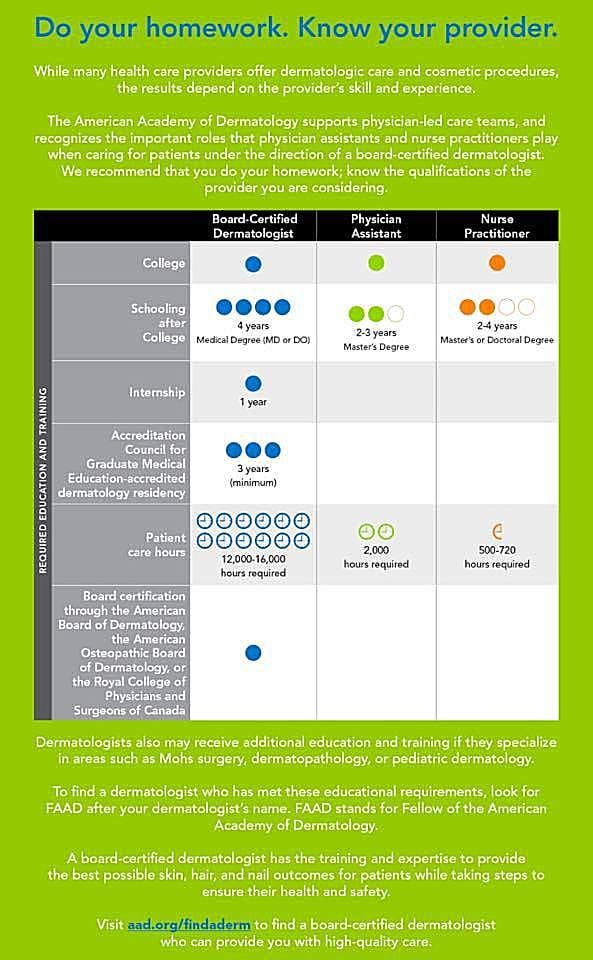
| The world has changed tremendously since I started my journey to become a board-certified dermatologist. It shouldn’t be a surprise. The journey was long. This is the path to getting my physician credentials: 1. College (Harvard) – four years 2. Medical school (Yale) – four years 3. Internal medicine internship (spending every 3rd night in the hospital- University of California, San Francisco) – one year 4. Dermatology residency — (University of California, San Francisco)- 3 years 5. Board certification- passing a multiple-day examination. In order to be able to offer my patients high-quality care, I made the investment. No shortcuts were taken. Nowadays, however, there are many people in the healthcare marketplace offering patients services who did not get the training of a board-certified dermatologist. Sometimes these individuals misrepresent themselves, preying on the general public’s lack of understanding of physician credentials. Here is what you should know to make the best choices for your health: 1. Board-certification is the gold standard of accredited training in health care. Only physicians are board-certified. This means that your doctor did the most studying and training in a particular area and has the most experience when they start practicing. For example, a doctor must complete 4 years of school and at least 4 years of post-graduate ACCREDITED (meaning standardized) training AND pass an examination to establish their fund of knowledge before they can practice as a “board-certified dermatologist.” A physician assistant, on the other hand, can start practicing after only 2 years of school (that’s because they are supposed “extend” a doctor under close supervision). 2. There is no such thing as a “board-certified dermatology” physician assistant (PA) or nurse practitioner (NP). Although some physician extenders may specialize in dermatology, and some even have extensive experience, only physicians are board-certified. When someone markets themselves that way it brings up ethical and legal concerns because it suggests that they are trying to convince the public that it should have more confidence in their expertise than their training should merit. 3. Years of experience is not a substitute for board-certification. Accredited residency programs are held to particular standards of what the doctors must learn and experience, and who it is that teaches the doctors, before they are even eligible to take the test to be board-certified. Physician extenders, such as physician assistants, may only be experienced in whatever the physician they work with needs them to do. So, although a board-certified dermatologist must have had exposure to the management of skin cancer, hair loss, and acne, even if they exclusively do cosmetics in practice, an experienced dermatology physician assistant may have only been exposed to operating a laser in the board-certified dermatologist’s practice. Further, because board certification must be maintained, the board-certified doctor must invest in several hours every year of specialty-specific accredited continuing educational study and take an examination every 10 years. Physician assistants, as they are not board-certified, do not have these requirements in order to extend the services of the doctors they work with. 4. Not all “doctors” are physicians. Did you know that an English professor at a university with a Ph.D. is also a “doctor?” This is not the kind of doctor you are expecting when you seek health care. You are expecting a doctor with a license to practice as a physician. Although one might not make the mistake of thinking an English professor could write a prescription, patients must now be careful, however, of other non-physician doctors who can prescribe. It has become popular for professionals such as physician assistants and nurse practitioners to get additional degrees, doctorates, that given them the designation “doctor” although they are still not physicians. When you are looking for certain expertise it is important to know the difference. 5. Not all physicians are board-certified in the area they are practicing in. A licensed physician does not have to do a residency in order to practice. A licensed physician may do a residency in one specialty and end up practicing in another. This is legal. What is not legal is marketing oneself as “board-certified” in a specialty one is not board-certified in. So for, example, a family practice physician may open an aesthetic medicine practice, or even practice dermatology, but he or she may not market themselves as a “board-certified dermatologist.” Not only are physician credentials important, but what kind of physician credentials one has also matter. |

| Read Dr. Strachan’s bio here. |
| Your health and beauty are invaluable. You pay a lot for your healthcare. Make sure you know what you are getting when you seek help. For more on this topic check out Dr. Strachan’s popular Linkedin article: https://www.linkedin.com/pulse/blurred-lines-my-doctor-really-dr-dina-strachan-m-d-/ And listen to her guest podcast interview on The Culture Soup here or on the platform of your choice: https://www.spreaker.com/user/10917884/ep-28-hacking-social-medias-blurred-line |


